Nataliia Hryniuk
Nataliia always has a plan! Both literally and figuratively.
Self-organization is her life principle, planning is her business, time management is her constitution, and coordination and communication are her tasks at B50.
Nataliia’s unique ability is to manage everything!

Read #B50heroes interview with Nataliia Hryniuk:
- how she gained 15 years of volunteer experience at 31;
- what a PR manager of show business stars does on the rubble in Moshchun
- how to solve many problems using logical thinking and analysis;
- how random non-accidents in life significantly change the vector of movement.
| Name | Hryniuk Nataliia Oleksandrivna |
| City | Rozhyshche, Volyn region |
| Age | 31 years old, birthday – January 11 |
| Profession, occupation | PR-manager, sells products for planning and organization, Head of Communications at B50 |
| Hobbies | road trips, volunteering, planning, dancing |
| Sea or mountains? | mountains |
| Childhood sport | basketball |
| Favorite food | tomatoes and ice cream |
– Nataliia, where were you on February 24? How did you know that russia’s large-scale invasion of Ukraine had begun?
At home, in Kyiv, at Lisovyi Masyv. I get up early, it’s a normal rhythm of my life. Then I woke up from a bad dream. I dreamt that some big black bird was flying over us and I felt so uncomfortable. I went to the kitchen and heard explosions. I can’t say I was scared, but rather suspicious. These were sounds I had never heard before. So I immediately went to Google. At that time, reports about the shelling of Ukraine, the war, etc. were just beginning to appear.
I can’t say that it was unexpected to me. When I fell asleep in the evening, I saw information about the state of emergency across the country. I’m one of those people who have been convinced since 2016 that the situation would be worse than just the annexation of Crimea and the “unrest” in Donbas.
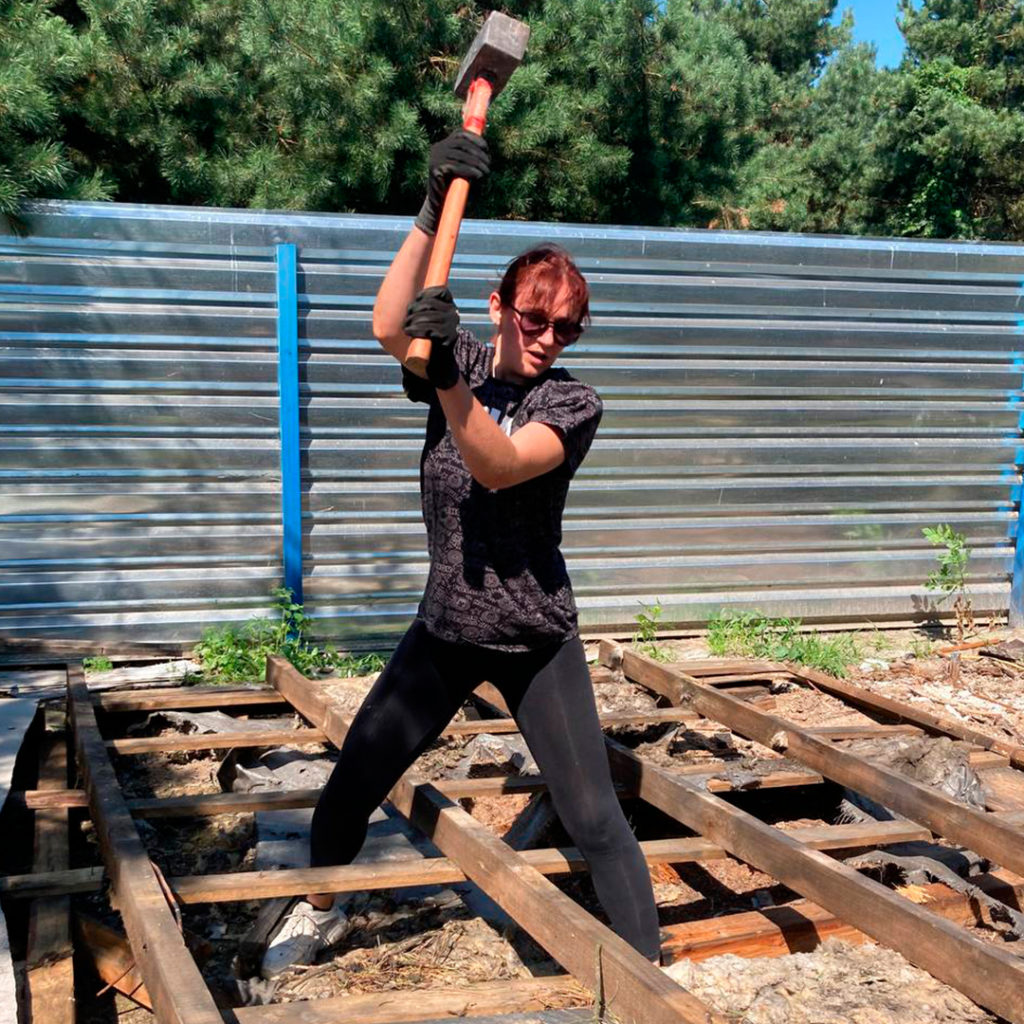
– How much worse? Did you realize that there could be a war like this in the center of Europe?
– 2014 immersed me in this quite a bit. I was actively monitoring what was happening, how it was happening, what negotiations were going on, what documents were signed, what they wanted.
Fortunately, I have no relatives in russia, and I didn’t know the country very well. But since childhood, I have wondered why, after something happened in Ukraine, it was mentioned in the news: “And the kremlin’s reaction to this was…”. What the f*ck is the kremlin’s reaction? Why should I be interested in their reaction? Let the kremlin live, and we will live!
In 2016, I was a participant in a project where I went to Kramatorsk with russians to study the method of nonviolent communication in order to reflect on the experience of the events in Donbas and to achieve some results in a peacekeeping project. At that moment, I probably had a catharsis. I realized what kind of nation they are, what thoughts they live with in their heads. I understood a lot about their propaganda and potential. And when I came back from there, I said: there will be something worse…
Many people told me: come on, what else can they do? But this “worse” had to happen eventually.
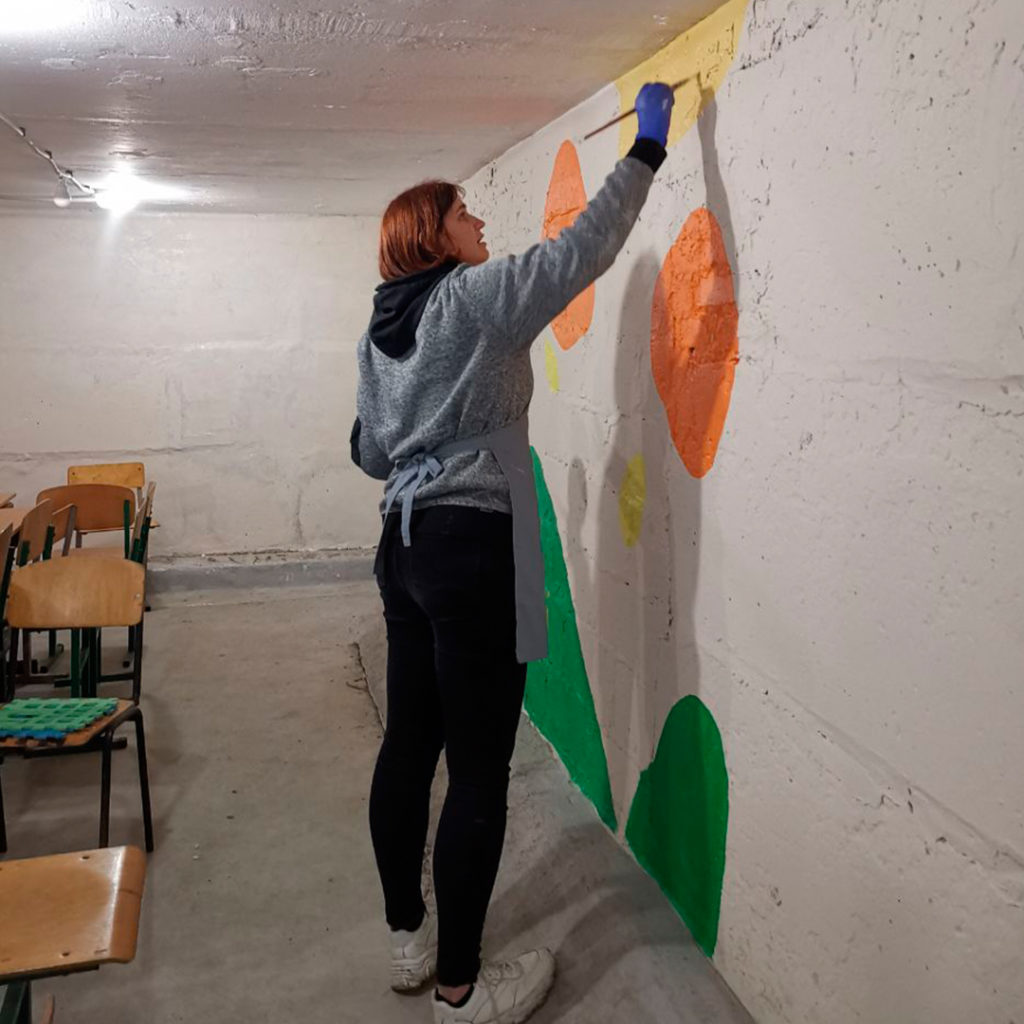
– When you learned about the beginning of the full-scale invasion, did you have any thoughts of running away? You have parents in Volyn.
– What’s there in Volyn? 100 kilometers away, and Belarus is already there. It could have been a bad situation. I had a different position: to see how everything would develop.
I understood the scale of Ukraine, it is a big country after all. We still had to see what would happen and where. I stayed in Kyiv to watch. I had food, my car was fueled, and I had food for two weeks (although I don’t usually stock up). The only thing was that I had about a week’s worth of animal feed.
So on the first day, we went to the supermarket to buy food for the cat and dog, even without queues, and withdrew cash, and everything was so calm around us, no panic. Apart from two explosions that I heard in the morning, apart from the information from the news, it was generally quite calm outside (in my understanding, because I expected more panic from people).
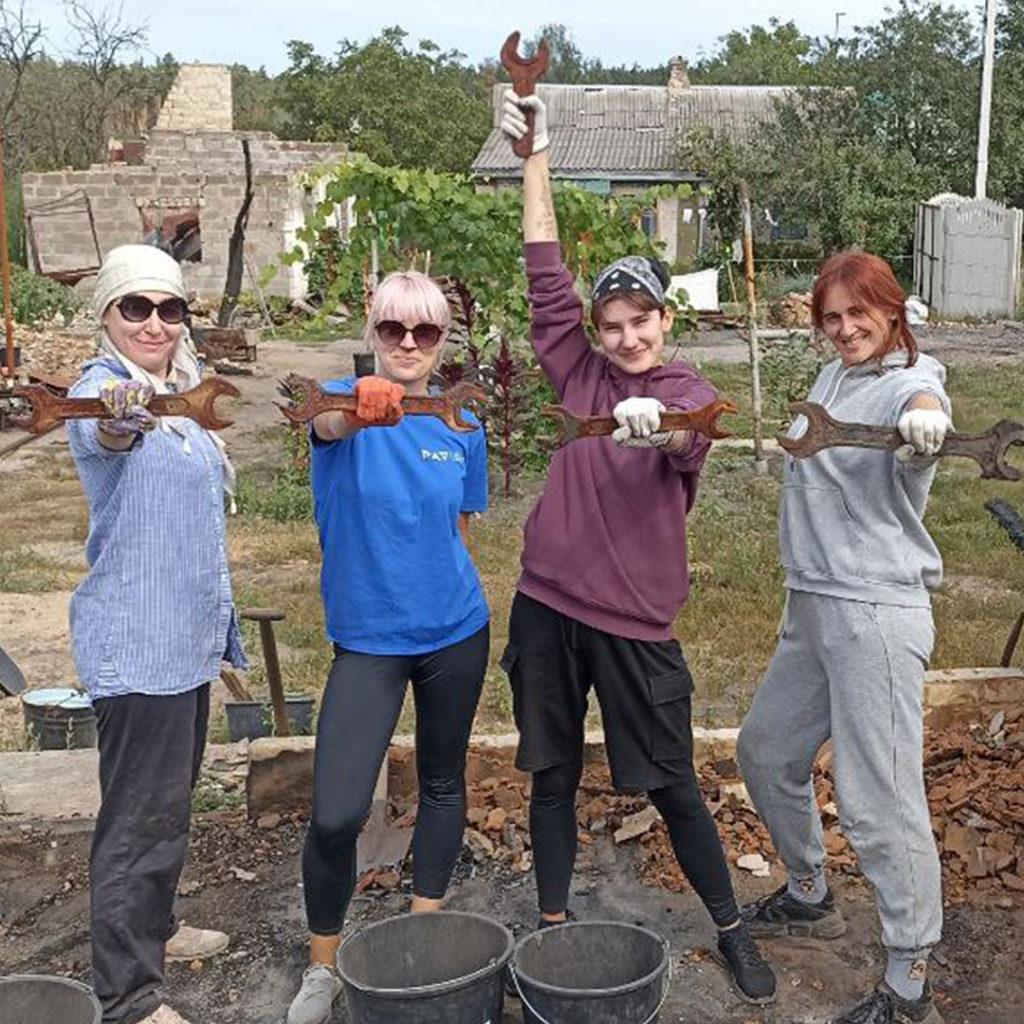
– Were you in Kyiv the whole time?
– No. We left somewhere in early March. It was the time when food became scarcer. I monitored the news, where people were moving. And when I saw that certain battles were already taking place almost near Brovary, I thought it was better to leave. My house is actually on the first line at the entrance to Kyiv from that side. My friend, who was fleeing from Northern Saltivka from Kharkiv, said, “you should carefully monitor whether the artillery is getting through.” I thought: what if something goes wrong and there is artillery shelling in the morning? Artillery, as I understood from my friend’s explanation, is the worst. Because the likelihood of coming under rocket fire is much less than under artillery fire in combat.
At that time, Zhytomyr highway was already blocked, and there was no bridge in Stoyanka. So we had a complicated and rather long route planned. To be honest, I was traveling with the idea that I might not return to Kyiv. That’s why I took my planners with me.
I took a lot of things then) Even summer clothes and cosmetics. I thought that there might be a possibility that I would go to Europe to work somewhere, because it would be impossible to earn a penny in Ukraine. And I’m the only one in my family who can travel (except for my brother, who lives abroad, but he can’t support three families). So I took the basic things.
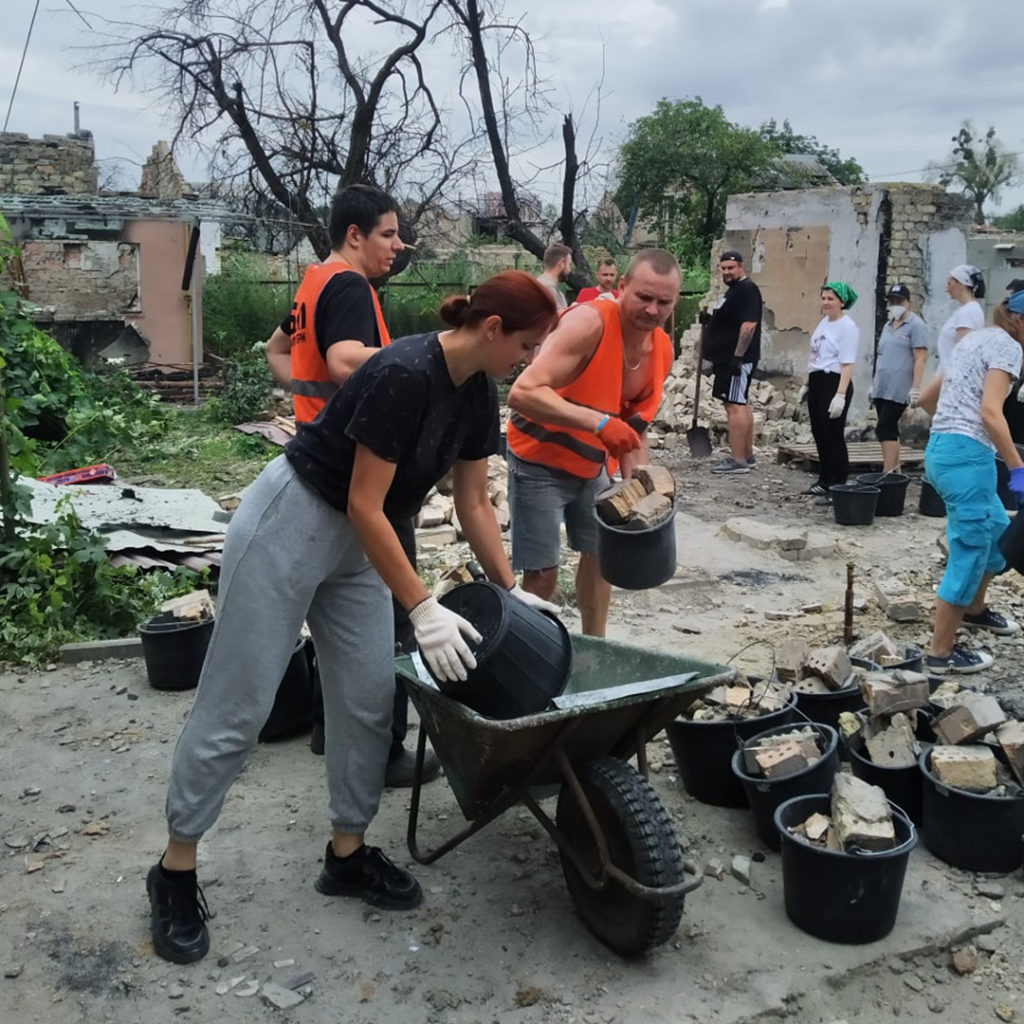
– Did you stay with your parents in Volyn with the idea that you would have to go abroad and work? What changed later? When were you able to return to selling planners?
– Sales resumed on April 5, and I received my first order. I sell on marketplaces. On one of them, the least popular, I did not remove the products from stock (on all the others, they were hidden so as not to misinform people).
It was a single order, not a stream. A person from Ternopil ordered it. And I thought to myself: oh, someone needs this, someone is planning for the future! And it was a strong message. I thought: it means we’re coming back!
In the first month I didn’t earn much… 250 hryvnias net))) But the very fact that people have plans (for the war and for after the war) was inspiring.

– Where did this idea come from? Why planners? And how long have you been working in this area?
– It happened by chance, out of a near-depression. After a difficult year at work, I took a break, and then the Covid started, and I had no income. To cheer me up, my friend gave me a course on finding a job and said, “I know you don’t believe in it, but just try it.” I trusted her and promised to do all the assignments, even the crazy ones from my rationalistic point of view. Thanks to one of them, I saw my strength – to systematize, to create structure out of chaos, to design the future. The rest of the story is a “business classic”: I saw an advertisement for magnetic planners, wanted one but didn’t find it convenient, tried to make one myself, invested the last $100 in a test batch, sold it on my Instagram, earned $160, and thought, “This is working out well.”
The first year it was more of a hobby. I made a lot of mistakes. Since the second half of 2021, I’ve been devoting my life to it. And during the war, I expanded my business and started selling products not only for life planning but also for home organization.
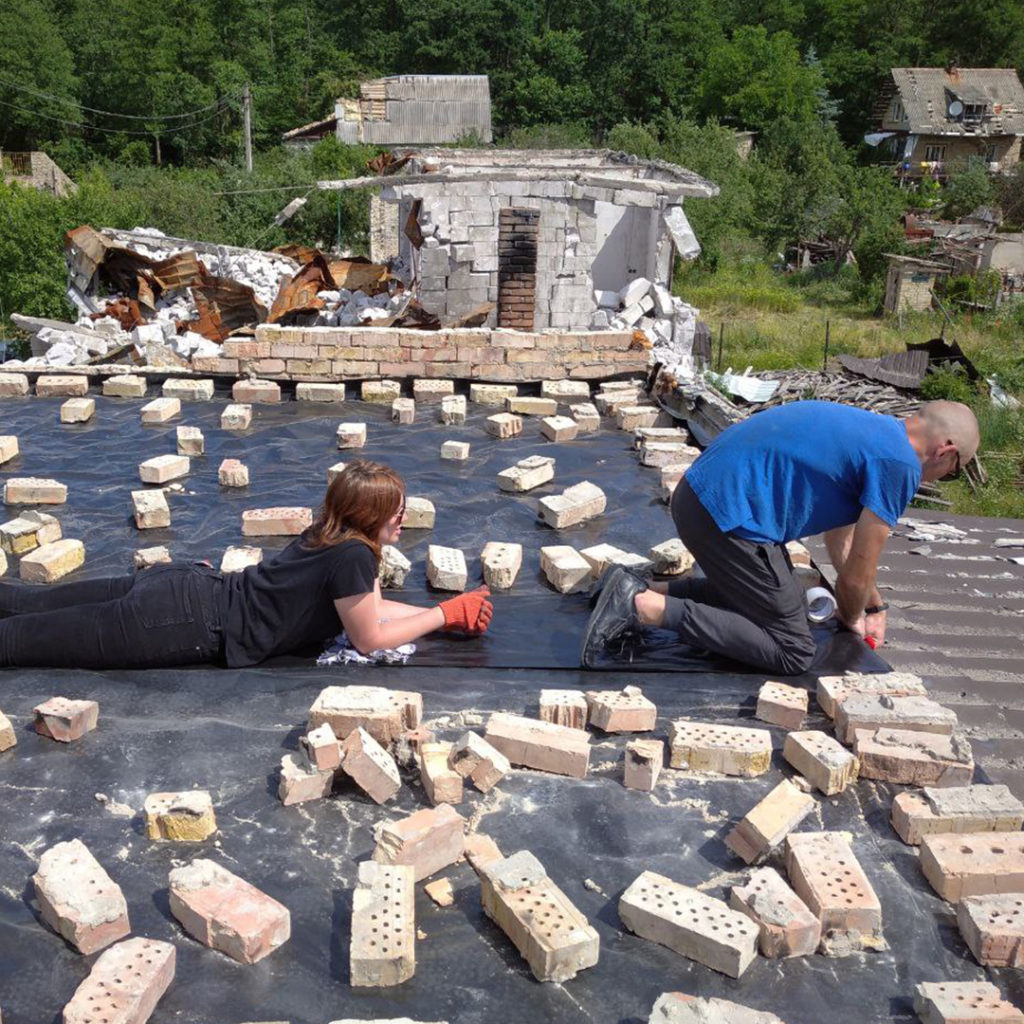
– How did you end up in Kyiv from Volyn? Did you come with the intention of becoming what?
– A PR person for show business stars.
– Which stars would you go to work for?
– I realized in my first year that I wouldn’t. It was not my first job, but actually an internship. I went to one of the top production centers. I was given a task, after which I said no. Because from that assignment, I understood the essence of the whole sphere of show business in Ukraine at that time (2010). I realized that I wouldn’t be able to work when there was so much falsity around.
– But you didn’t stop studying?
– I didn’t, because I entered the PR program. And they are needed in show business, politics, government agencies, business, even personal projects, and so on.
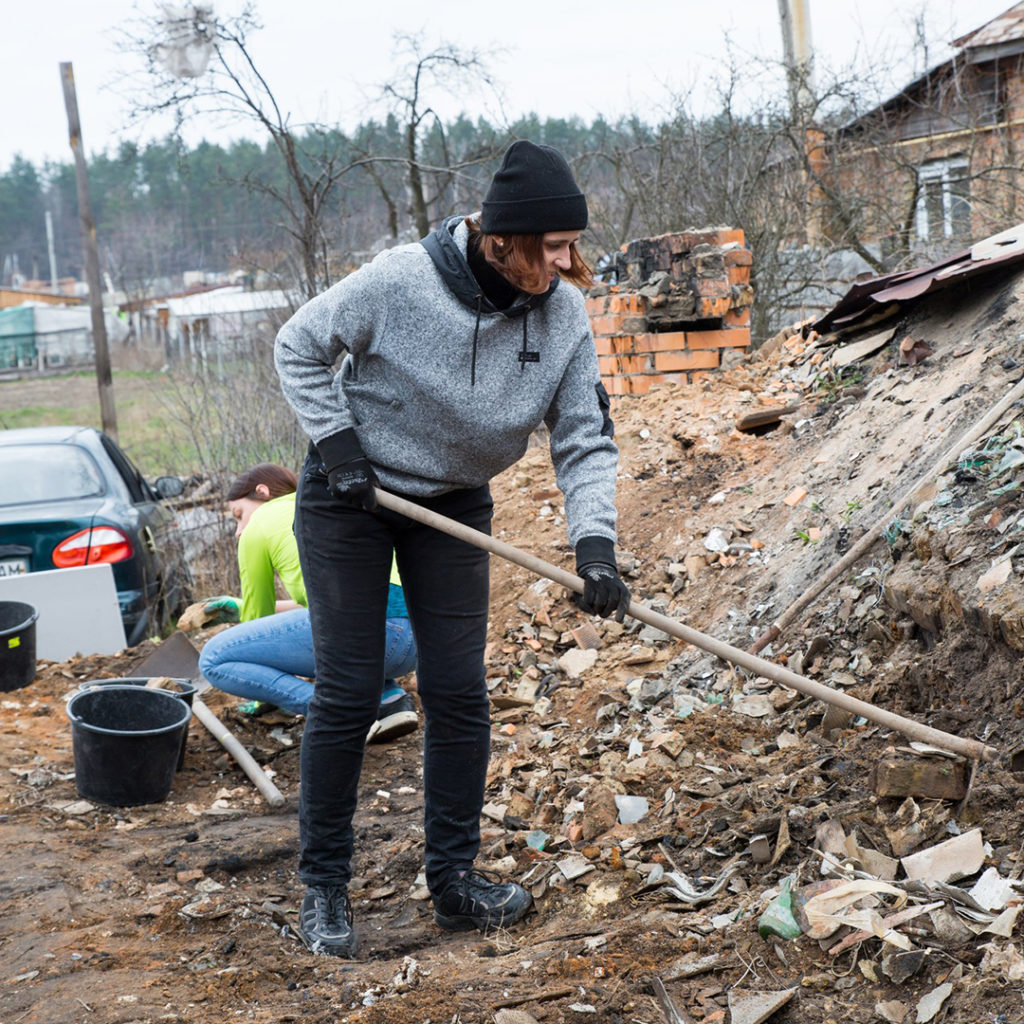
– How did you meet B50?
– At the end of April, when Irpin was liberated, I saw that the mayor was calling for volunteers to help with the cleanup. While I was in Volyn, I wrote to organizations that were doing similar things, but there were no active projects there. This is what I wanted to do, and this is what I saw myself doing in this war. I donated to the army, but I didn’t have the passion to organize a fundraiser, for example, for binoculars. But recovery is something I would do myself, even if no one was around. When you can feel like the only warrior in the field, then you move in the right direction.
On the way to Kyiv, I joined volunteer chats that deal with cleaning and restoration. And then a girl named Adel wrote to me and sent me a link. I used to receive similar things – mostly stupid ads or something related to drugs. I thought: these drug addicts again! But something made me click on it (with the condition that I wouldn’t download anything for safety’s sake). I went over and looked: volunteers! I thought, oh, something new: not drug addicts, but volunteers! The group was quite small. But by that time they had already gone to Borodianka. I got home and organized my life a little bit. About a week later, I joined the first trip with B50.
– Were you scared to go?
– What was there to be afraid of? The trenches? The only thing I was afraid of was that I wouldn’t be able to cope physically.
– When was the first time you came to clear and restore houses?
– It must have been in Moshchun. Because at first we went to Borodianka. There were tasks at the warehouse, sorting humanitarian aid, cleaning the modular town. But I was also sick for almost the whole of May. I would go on one trip and get sick, then go back and get sick. It was a fever or something else. I guess psychosomatics was making itself felt. Although I don’t believe in it very much, there were no other reasons for that.
In late May, we started going to Moshchun.

– What are your impressions of Moshchun?
– I don’t remember them very well, because at that time I was already traveling along the Zhytomyr highway, I was in Borodianka. I had already seen the destruction.
On the way from Volyn to Kyiv, we were driving slowly because there were still holes in the asphalt from shells. The vehicles and cars of the shot civilians were not cleaned up on the roadsides. That’s where I got my first impressions. And from there I concluded that it was roulette. Because one house was completely burned down, another had no roof or windows, and the third was completely intact.
I lived with the impression that war is roulette for almost a month until I got to Moshchun. And there I realized that it wasn’t roulette at all, but the whole street could be completely mowed down! I remember very well how I walked down the street and there was no house, only a stove. And so on for several houses in a row. It all depends on where you end up. Someone can be in a roulette, and someone under a scythe.
– Are there any particular hosts who you liked the most, who left an impression, or were you very sad and hurt?
– I remember the first day in Moshchun very well. It was B50’s first trip to the village, and there were no specific locations yet. The order of the day was as follows: we would arrive in the center of the village, people would be informed that volunteers were coming, they would come up and say: we need such and such help. We arrived and looked at this village in shock. The house of culture was completely destroyed, as was the shop. We stood there for an hour – no one came out. “Let’s get brooms, we’ll clean the center, because we need to do something!” I don’t really like it when you come to do something, and you are not allowed to do it. Because I have a certain amount of my time that I want to allocate to helping, I want to come and get to work right away.
Then the first girl, Alina, came to us with her mother-in-law from 99 Vyshneva Street. Andriy Karpenko, my driver and neighbor, also said, “What are we going to do, let’s go! The two of us helped them, and then more people joined us.
That’s why I remember them so much, because they were the first ones, and we worked for them all day.
Later, Alina and I corresponded and talked. And whenever I visit Moshchun, I always keep an eye on their house, how they are rebuilding it.
– Wasn’t it scary to go, since there were fierce battles in Moshchun? And how successful was the demining?
– I didn’t think much about it. I have the same signs on my property in the woods as in Moshchun. “Beware! Mines! No entry!”. “Mines” means don’t go there. The rules are clear.
I never thought about the possibility of finding something dangerous inside the building. When in July, new volunteers started asking me “are you not afraid of getting blown up by a mine?”, I was even surprised) It says “mines”, so there are mines there, there is nothing written here, so you can go here.

– Did you volunteer before the B50?
– Yes, most of my life. I probably started volunteering in the 10th grade for the first time. However, no one knows about it yet. Exclusive!
– What did you do?
– My first volunteering was at a performance. A boy came to our school and said: we are an organization, join us. My classmates said, “No way, you’re working for free, ew. And I felt so embarrassed, I quietly contacted this boy. I didn’t tell anyone, I was very ashamed that I would be judged. But I was really interested in being with people who were doing something, not just walking, drinking, smoking, etc.
I helped them at the performance. At the time I agreed with this topic, but now I don’t, because it was an action against abortion. But in that situation, it was valuable for me to try and see how it goes. This action was quite “picturesque” and impressed me.
– That is, if you count your tenth grade, you are a volunteer with almost 15 years of experience!
Well, I’m not here every day.) Now I’m at B50 much more.
In general, I used to be, let’s say, an event volunteer. When an event takes place and a team of volunteers is assembled to help with it. Plus, there were certain topics for which my soul ached, and I was there as an expert and as a volunteer at the same time.
Yes, I was a volunteer at Euro 2012. At the Eurovision Song Contest, too, I coordinated volunteers at the Eurocity, which was on the Maidan.
Then there was a time when I got involved in, I won’t call it “civic activism” because I perceived it as volunteering. I realized that I had an expertise in media literacy, and after 2014 it was very much needed, and I was doing it for a very long time. I had my own project, I taught, explained, and conducted training.

– Okay, but now you’re not only going to clean up and paint shelters, you’re also dealing with organizational issues. How much time does it take you to volunteer at B50? There are 24 hours in a day, 8 hours of which you have to sleep, and 16 hours remaining.
– About 4 hours a day is the minimum. Sometimes we have meetings with Ruslan, where we talk for 6 hours.) It’s hard to calculate, but it’s at least 4 hours a day. Every day. On a volunteer basis.
– What advice can you give to future volunteers who haven’t joined us yet and are just thinking about it?
– To think less. Because there will always be “today is not suitable”, “tomorrow my back hurts”, “the day after tomorrow does not work out”. Just try it once and realize that it’s yours/not yours. No more is required. Sitting and thinking: I’ll do it someday… This is the biggest sin.
– And what awaits them in the B50? And what is the future of the B50 in general?
– Rebuilding and restoration. I really hope that the organization will develop further in the vector of “restoration.” This is a problem that we will have to solve for at least 10 years after the victory. Physical reconstruction, mental reconstruction, etc.
There is a lot of work to be done. If there is sustainability, everything will be done. Partly by B50, partly by other organizations. We will all be fighting for certain grants, but in essence we will be doing the same thing. And it will not be a dirty fight, but a competition of quality.
Interviews were conducted by:
- Coordinator— Anna Norynska
- Interviewer — Valentyna Vrublevska
- Editor — Svitlana Rudokvas
- Transcriber and Build editor — Bohdan Holovchenko
- Translation — Anastasiia Lypchak


